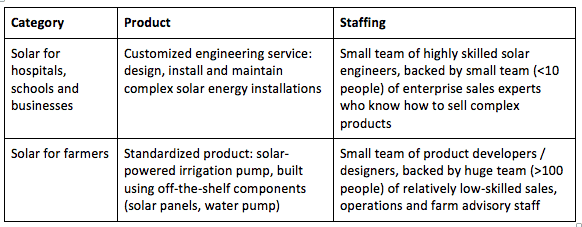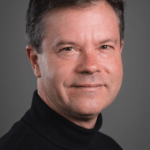Social Entrepreneurs, Ignore the Mantra of Focus at Your Own Peril
“Though the immediate cause of death in a startup tends to be running out of money, the underlying cause is usually lack of focus.” – Paul Graham, co-founder of Y Combinator
When SunFarmer went through Y Combinator in summer 2015, we heard a lot of startup wisdom, including Paul Graham’s mantra of focus. Sadly, we ended up ignoring it. We thought we were different from other startups because of how uniquely challenging our market is (Nepal and the developing world).
Our colleagues in Nepal pointed out that a regulatory change or unexpected competitor could wipe out a business overnight, so it was important to hedge our bets. It would not be surprising to find a Nepali entrepreneur running a food manufacturing company, an IT consulting firm and a hotel all at the same time!
So, SunFarmer Nepal took the approach of selling multiple products to multiple customer segments at the same time. We started by carving out a niche providing solar energy for hospitals and health clinics. When this segment didn’t grow quickly enough, we expanded into providing solar to businesses, and through our NGO connections we started selling solar power to farmers.
Being successful in any one of these customer segments is extraordinarily difficult, but succeeding in multiple segments at the same time is nearly impossible. The type of company that needs to be built to serve each segment is so different. Let’s compare two of the business lines:

While we struggled to get both of these businesses off the ground, we got advice from several successful solar entrepreneurs. We realized that building a successful product business, as we were trying to do with our solar for farmers product, is extraordinarily difficult. They strongly advised focusing on only one product at a time; even adding a second similar product too quickly created challenges.
- A solar entrepreneur in India said that adding a 20W product alongside their core 10W product line was a mistake; they weren’t ready to handle the logistics and operational challenges of selling two products.
- A solar entrepreneur in Mexico tried to sell cookstoves along with a core solar home system product line. However, the entrepreneur had to abandon cookstoves after finding that the customer education and sales process were completely different for the two products.
By trying to work on two product categories simultaneously, we fell into a trap to which many solar companies in the developing world fall victim: trying to work on multiple businesses at once, and in the end not being excellent at any one of them.
Since then, we created a new product development team tasked with identifying a customer segment that we can focus 100 percent of our energy on. After two months of research, we identified farming communities in the mid-hills region of Nepal as a promising customer segment. These communities grow high-value vegetable crops but do not have access to electricity in their fields for irrigation. Further, it is unlikely that they will get electricity access because of the high cost of building an electric grid that will reach these remote areas.
Since then, our product development team has been spending the majority of its time traveling to the field to speak directly with customers, understand their energy needs and determine how much they might be willing to pay for an energy offering.
If we are able to uncover an exciting business opportunity, SunFarmer will dedicate 100 percent of our attention to serving these farm communities. If we can’t find a promising opportunity, then we will leave behind this customer segment altogether and pick a new one.
But we will not make the mistake of working on two different businesses at the same time. We plan to stay focused and put all of our efforts behind one business that we think has the highest chance of success.
Andy Moon is the co-founder and CEO of SunFarmer, a nonprofit social enterprise that incubates and launches locally run solar businesses in developing countries.
Photo courtesy of SunFarmer
Homepage photo credit: Michael Dales, via Flickr.
- Categories
- Energy, Social Enterprise



